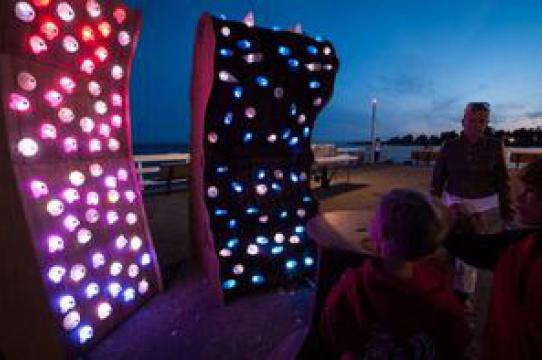Oceanic Scales by Gene A. Felice II (DANM '14) & DANM Principal Faculty Member Jennifer Parker with support from the OpenLab Research Center at UCSC and the Coaction Lab at the University of Maine.
Visitors will explore their role in maintaining a stable ocean ecology through a multi-sensory, interactive art and science puzzle inspired by the microorganisms of the sea. Visitors can reflect on and better understand how humans impact the environment at local and global scales. Light, scent, sound and touch inspire new ways of thinking about ocean health. Oceanic Scales explores the visualization and contextualization of ocean sensor data into a creative digital output, streamed from the MBARI Elkhorn Slough sensor array API located in the Monterey bay on the California central coast. Visitors can absorb multi-sensory interpretation of ocean data as complex patterns of light and sound, or they can decide to become an active agent of change, trying out various trial and error scenarios by adjusting temperature, PH and nitrogen levels within the automated gaming system. Instability may lead to a system crash; harmony and grace can be achieved through perceived stability, patience and new understanding. The physical structure is built with local bamboo plywood and pine resin, corn plastic 3D printed forms, recycled cardboard, natural latex rubber, solar power and a living component of native plant species.
An interdisciplinary team of faculty and students from Digital Arts & New Media, Film & Digital Media, Marine Biology, Ecology, Computer Science and Engineering at UCSC came together to make this idea possible. Gene Felice, Jennifer Parker and the Openlab research group and the Coaction Lab have given their creativity, time and effort to see this project through to completion. Students received access to equipment, experience, training and new inspiration as well as greater understanding of the natural systems that we have a responsibility to maintain.



